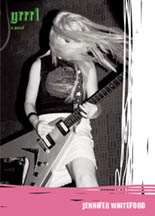Grrrl, You’ll Be a Womyn Soon: Review of Jen Whiteford’s New Book
The Ottawa XPress | June 1, 2006
BOOK REVIEW
Jennifer Whiteford’s Grrrl (Gorsky Press, 252 pp.)
Whiteford’s channels her own rock star dreams through the novel’s riot grrrl
Play. Stop. Rewind. Jennifer Whiteford’s distinctive debut novel, Grrrl, is like a killer mixtape from the early 1990s that you want to play over and over again.
Grrrl chronicles teenaged Marlie’s rock star dreams and curious crushes that lead her into an underground world of punk rock, riot grrrls, and a dangerous relationship with an older indie rocker. It’s all channelled into Marlie’s ever-present diary entries that are put together seamlessly to create a jolting coming-of-age tale that is positively addictive. After you race through the 252 pages and swoon from the book’s closing lines, you’ll crave more Grrrl, it’s that grrreat.
The novel grew out of Whiteford’s own high school journal and was based on characters she’s fictionalized from the years spent writing to musicians. “When I got really obsessed with an album, I’d write them [the band] a letter,” Whiteford tells XPress. “What I really wanted was someone to pay attention to me as a teenager and respond.”
Whiteford’s rock star mentorship program worked wonderfully: It plugged her into the Toronto downtown music scene, whereas teenage life in the suburbs made her feel disconnected.
Many passages, including the book’s opening lines – “My stereo ate my favourite Pretenders tape today” – come from the formulaic teenager world of young adult fiction with its self-absorbed and inconsequential observations. But soon it becomes evident that we’ve landed in a literary universe far more sophisticated than a pissed-off teenager pining for Chrissie Hynde.
Marlie’s complaint conceals the universal dissatisfaction with life at the end of summer before starting grade 10: “I can’t think of anything else I want to listen to,” Marlie writes. “I’m feeling really indecisive lately about everything, not just music. I don’t know how I want to dress, how to cut my hair, which music to listen to and who to hang out with.” Whiteford frames the problem and develops the resolution cleverly through superb character development and nail-biting episodes.
Marlie’s Uncle Ben, who works at the downtown Sam the Record Man and his girl-band role model girlfriend Sheena, help Marlie on her journey of self-discovery by taking her to Seattle. There, she discovers the riot grrrl movement that ignites her transformation.
Wikipedia defines “riot grrrl” as “a movement encompassing zines, festivals and hardcore punk rock music groups, known for its feminist stance.” The genre first appeared in the early 1990s as a response to punk machismo.
While at a riot grrrl event, Marlie thinks maybe she’s a lesbian, but also learns how to make maxi-pads at a MoonGrrrls workshop. She freaks out: “I’m totally connected to the moon! Everyone is!” This infectious glee at newfound knowledge endears us to the Marlie character in precious interior moments.
When Marlie returns home, she’s frustrated: “I want to be living in THE CITY not the suburbs!” she sneers. “I want to dye my hair crazy colours and play in a band and go to concerts and have other girls around me who want to do the same things!” So she starts an all-girl band with her friends.
Part of Whiteford’s own point here is that finding yourself “comes from finding your place in a scene, this idea that you’re becoming an expert in something.
“Marlie’s not listening to the Sex Pistols or The Clash,” Whiteford adds. “The thing that really takes her in is the band that she’s a part of. She doesn’t worry about punk cred. Marlie is driven by her riot grrrl politics.”
This speaks to Whiteford’s experience as a female writer living in Ottawa. “I know about riot grrrl. I know about this scene,” she says authoritatively. “I’m going to be unapologetic.” Fierce but fair words for a city where the music scene, often dubbed a boys’ club, would crumble just because of a loud-mouthed girl.
Moving to Ottawa six years ago got her interested in Ladyfest, and in 2000, Whiteford travelled to Olympia for the first Ladyfest. “I saw all the bands I ever wanted to see,” she says, “learned to skateboard and did lots of cool stuff and came back and said, ‘I’m going to write a book now.'”
Grrrl is a valuable contribution to Canadian literature because it tenderly expresses the struggle of girls who adore music and are desperately seeking a way in.
For guys who love books about music, there’s Nick Hornby. For the girls, it’s Jennifer Whiteford.
Jennifer Whiteford launched Grrrl on Saturday, June 3, at the Manx Pub (370 Elgin St.). Visit www.matildazine.org for Whiteford’s online zine.
Grrrl is published by Los Angeles, California’s Gorsky Press, the drivers behind the Perpetual Motion Roadshow and the on-line independent music magazine, Razorcake.
– Sylvie Hill
